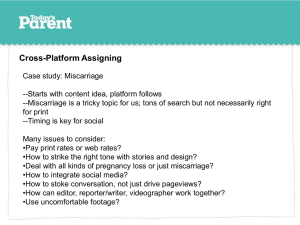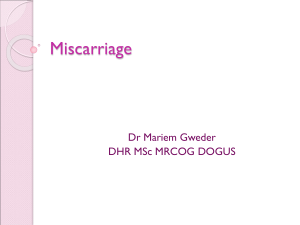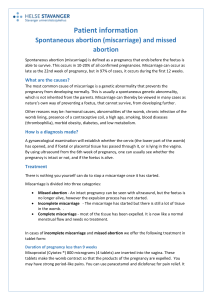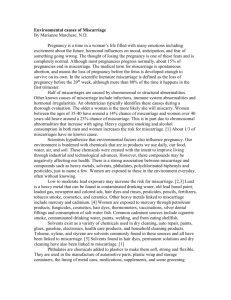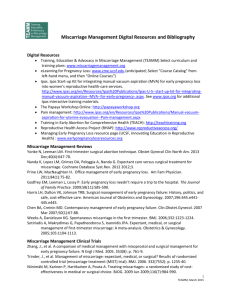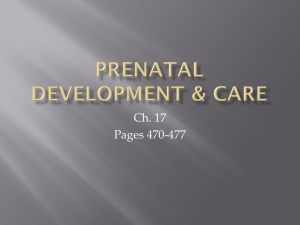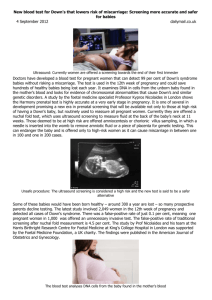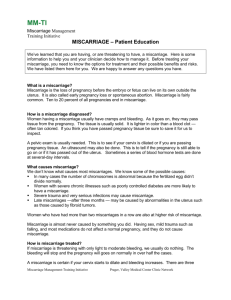Miscarriage Management Training - Reproductive Health Access
advertisement
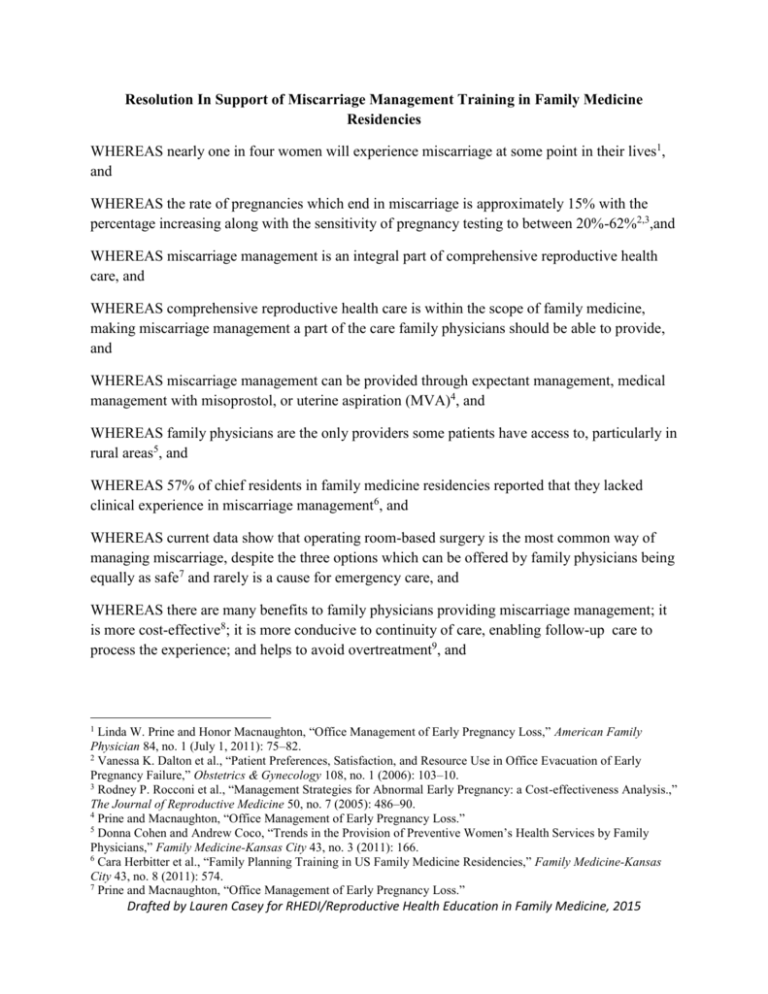
Resolution In Support of Miscarriage Management Training in Family Medicine Residencies WHEREAS nearly one in four women will experience miscarriage at some point in their lives1, and WHEREAS the rate of pregnancies which end in miscarriage is approximately 15% with the percentage increasing along with the sensitivity of pregnancy testing to between 20%-62%2,3,and WHEREAS miscarriage management is an integral part of comprehensive reproductive health care, and WHEREAS comprehensive reproductive health care is within the scope of family medicine, making miscarriage management a part of the care family physicians should be able to provide, and WHEREAS miscarriage management can be provided through expectant management, medical management with misoprostol, or uterine aspiration (MVA)4, and WHEREAS family physicians are the only providers some patients have access to, particularly in rural areas5, and WHEREAS 57% of chief residents in family medicine residencies reported that they lacked clinical experience in miscarriage management6, and WHEREAS current data show that operating room-based surgery is the most common way of managing miscarriage, despite the three options which can be offered by family physicians being equally as safe7 and rarely is a cause for emergency care, and WHEREAS there are many benefits to family physicians providing miscarriage management; it is more cost-effective8; it is more conducive to continuity of care, enabling follow-up care to process the experience; and helps to avoid overtreatment9, and Linda W. Prine and Honor Macnaughton, “Office Management of Early Pregnancy Loss,” American Family Physician 84, no. 1 (July 1, 2011): 75–82. 2 Vanessa K. Dalton et al., “Patient Preferences, Satisfaction, and Resource Use in Office Evacuation of Early Pregnancy Failure,” Obstetrics & Gynecology 108, no. 1 (2006): 103–10. 3 Rodney P. Rocconi et al., “Management Strategies for Abnormal Early Pregnancy: a Cost-effectiveness Analysis.,” The Journal of Reproductive Medicine 50, no. 7 (2005): 486–90. 4 Prine and Macnaughton, “Office Management of Early Pregnancy Loss.” 5 Donna Cohen and Andrew Coco, “Trends in the Provision of Preventive Women’s Health Services by Family Physicians,” Family Medicine-Kansas City 43, no. 3 (2011): 166. 6 Cara Herbitter et al., “Family Planning Training in US Family Medicine Residencies,” Family Medicine-Kansas City 43, no. 8 (2011): 574. 7 Prine and Macnaughton, “Office Management of Early Pregnancy Loss.” 1 Drafted by Lauren Casey for RHEDI/Reproductive Health Education in Family Medicine, 2015 WHEREAS family medicine residents are not routinely trained in miscarriage management, and there is a specific gap in opportunities to train in uterine aspiration10,11, and WHEREAS by including office-based miscarriage management training in family medicine residency training more women could access care from their own family physicians12, and WHEREAS family medicine residents need to have direct, hands-on training during residency in order to be able to provide miscarriage management, now therefore be it, RESOLVED that the New York State Academy of Family Physicians write a letter to the Review Committee requesting the inclusion of miscarriage management within their training requirements, and be it further, RESOLVED that the New York State Academy of Family Physicians include miscarriage management within their Continuing Medical Education meetings as a hands-on, skill-building workshop, and be it further, RESOLVED that the New York State Academy of Family Physicians supports the overall integration of comprehensive miscarriage management training into family medicine residencies, and be it further, RESOLVED that the _AFP’s delegates to the AAFP Congress of Delegates will present a resolution for the AAFP to support the integration of comprehensive miscarriage management training into family medicine residencies. Lisa H. Harris, Vanessa K. Dalton, and Timothy R. B. Johnson, “Surgical Management of Early Pregnancy Failure: History, Politics, and Safe, Cost-effective Care,” American Journal of Obstetrics and Gynecology 196, no. 5 (May 2007): 445.e1–445.e5, doi:10.1016/j.ajog.2007.01.013. 9 Prine and Macnaughton, “Office Management of Early Pregnancy Loss.” 10 Herbitter et al., “Family Planning Training in US Family Medicine Residencies.” 11 Cara Herbitter et al., “Management of Early Pregnancy Failure and Induced Abortion by Family Medicine Educators,” The Journal of the American Board of Family Medicine 26, no. 6 (2013): 751–58. 12 Melissa Nothnagle, Linda Prine, and Suzan Goodman, “Benefits of Comprehensive Reproductive Health Education in Family Medicine Residency,” FAMILY MEDICINE-KANSAS CITY- 40, no. 3 (2008): 204. 8 Drafted by Lauren Casey for RHEDI/Reproductive Health Education in Family Medicine, 2015

